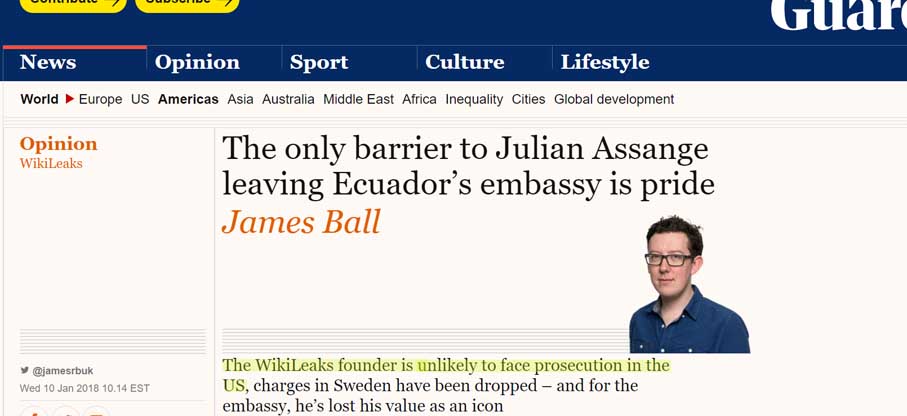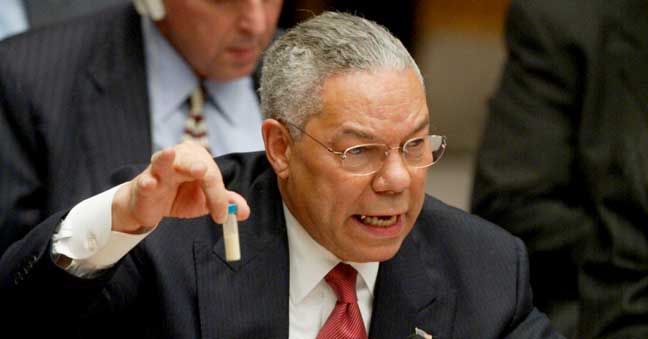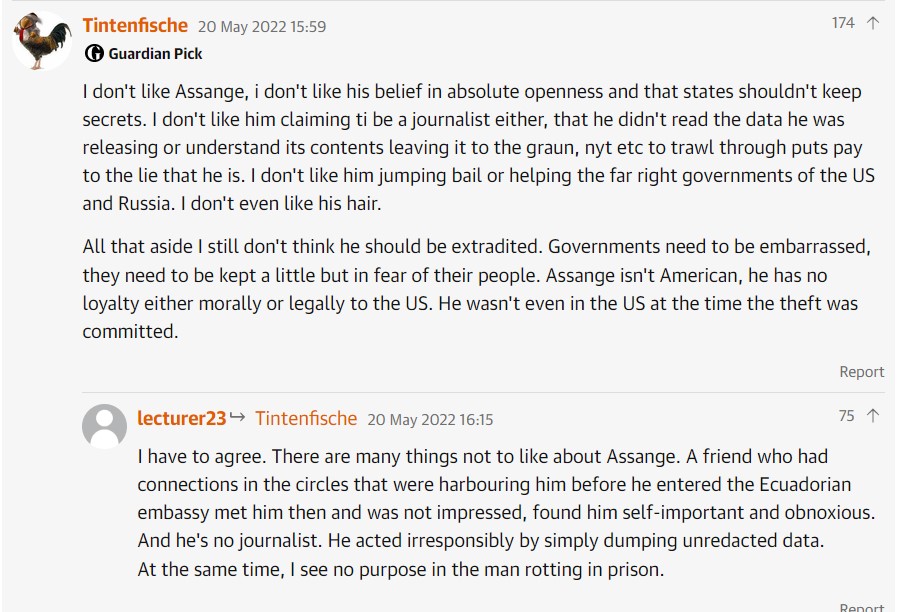
One measure of the deep sleep in which the vast majority of Westerners are immersed is that the decision on Friday by British Home Secretary Priti Patel – to allow the extradition of Julian Assange to the near certainty of ending his days confined to a tiny for-profit jail cell in the state his fellow Australian, Caitlin Johnstone, accurately calls “the most tyrannical regime on earth by a massive and easily quantifiable margin” – will be a matter of less consequence than whether to start the day with cornflakes or rice krispies.
(Another is the success with which a preposterous and evidence-defying narrative on Ukraine has been sold by the US ruling class and its junior partners across the Western world, but today I’ll stick with Julian. 1 )
Only the politically imbecilic and the criminals who rule (a few through political office, most in the shadows) would contest that this man told us nothing but truth about the crimes against humanity committed, and bare faced whoppers told, by the fake democracies of America and its allies, and by media whose business models debar them from any course other than tokenly critical complicity.


No, please don’t protest unless you (a) know what you’re talking about – most, as we’ll see, do not – and (b) have evidence on these small points when, with not one Wikileaks claim refuted, and the systemic corruption of corporate media matters of empirical fact, burden of proof lies decisively with those who still maintain – some flat out and unblushing, in that way the smugly stupid have of making ignorance a virtue; others by weaselly insinuation and craftily qualified ‘support’ – that Julian Assange does indeed have crimes to answer for …
… such as that he “behaves like a tinpot dictator” (George Monbiot) … is tainted by rumours of rape (Owen Jones and countless others whose elevation of identity politics over those of class and empire made them credulous consumers of smear whose particulars they did not trouble to study) … is an “arsehole” (Marina Hyde) and a “massive turd” (Suzanne Moore). Not to forget what the extraordinarily prescient and sagacious James Ball helpfully pointed out to his readers – see my opening image – namely, that the man is insufferably proud.
I also heard credible reports that he has BO, picks his nose and only went to Sweden because he adores Abba.
Unfortunately, the politically imbecilic is a very large constituency. Here’s what I wrote recently about the way liberal intellectuals blithely feed the rumour mill which has done so much to facilitate not only Julian’s ordeal, already eleven years old and set to continue for the rest of his days. In the process that same rumour mill – and to be clear, I do not rule out conspiracy in the shape of “talking points” set by a few spinmeisters and activated by agents amid the chattering classes and their forums of choice – also serves to assure Power that it may with impunity crush any future attempt to publicise even the smallest fraction of its limitless criminality.
At a bus stop a friend tells of a Graun journo pal who knew Julian and found the man obnoxious. There are several responses I could make. For one thing, when these tales do the rounds – in a bar as the Johnny Walker wisdom runs high … at some Islington dinner party … via water cooler exchanges in a zillion office settings – such ‘insider’ titbits are invariably conferred at one step removed by someone who knows someone who Knows.
For another, the recipients seldom ask the key question; cui bono? Whose interests are served by such unfalsifiable tittle-tattle? So credulous a failure on the part of a liberal intelligentsia which habitually confuses scepticism with cynicism – and its consequences for a very brave man (whatever else he may or may not be) deserted by what should have been his staunchest support base – are what make such bone idle gossip so toxic.

Most disturbing of all: for the Marina Hydes and Suzanne Moores of this world, and more to the point for their readers, the question of whether or not Julian is “an arsehole” counts for so much more than whether or not he spoke truly, and at great personal cost, about the appalling crimes of Empire and its servants.
(Spoiler alert: though all are highly specific, not a single Wikileaks claim has been refuted. But who cares? The single most salient aspect of Planet Guardian is that [the US] empire is invisible to its columnists and core readership alike. On the dark side of its moon, so to speak.)
But we’d had a couple of beers and I was in too good a mood to be baited. Just before our bus turned up I gave my blandly laconic response to this friend-of-a-friend sagacity.
“That’s perfectly irrelevant.”
On that last I was wrong of course. I premised it in logic, whereas homo sapiens sapiens is more your psychological than logical animal. But barely a fortnight later, on hearing the Patel ruling, I looked up what Craig Murray – himself a whistle-blower and serial victim of state persecution whose coverage of the Kangaroo Hearings of Julian’s extradition request featured often on this site 2 – had to say.
I couldn’t find anything written after the ruling, but a May 25 post on Craig’s blog begins thus:
The Power of Lies
The comments on Peter Oborne’s excellent article on Julian Assange in the Guardian 3 last week are a damning indictment of the media’s ability to instil near universal acceptance of “facts” which are easily proven lies. The Guardian chose as its “Guardian pick” to head the section a comment full of these entirely untrue assertions …

Note how lecturer23 does the very thing I just described. S/he invokes a well connected buddy who met Julian and “was not impressed”. So lecturer23 basks in the reflected glory. By having a well connected friend s/he too is rendered well connected. More to the point, such evidentially worthless assertions punch well above their weight in advancing empire agendas.
As for Tintenfische, I know him (rightly or wrongly I infer masculinity from style) of old, from a time when I could be bothered to engage in below the line exchanges at the Guardian. I found him intelligent, informed and sharp – but painfully afflicted by the blindness of which I spoke:
The single most salient aspect of Planet Guardian is that the US empire is invisible to its columnists and core readership alike.
More to the point here, Tintenfische’s second paragraph is a textbook case of what I mean by “weaselly insinuation and craftily qualified ‘support'” for Julian.
And his first paragraph? Why don’t I let Craig do the talking?
… If you look through all the comments, they repeat again and again that Wikileaks published unredacted documents, including names of US agents, which put lives at risk. The entire basis of most of the comments is simply untrue – and none of the readers seems to have any information to contradict them.
Julian Assange has never said that governments should have no secrets. That would be a ridiculous position and clearly some information held by government is rightly confidential. He has said that governments should be very much more open to the public, and that most government secrecy is unjustified.
Nor has Wikileaks ever dumped data unread and unedited on to the internet. The commenter is correct to say that Wikileaks has shared editing responsibilities with organisations including the Guardian and the New York Times. This is precisely because the material needs to be edited to avoid revealing inappropriate material, and to make journalistic decisions on what to write stories about.
The notion that Assange was “lazy” because he did not read all the material and do all the editing himself is self-evidently ridiculous. The US diplomatic cables and Iraq and Afghan war logs alone constituted over 600,000 documents. It was simply impossible for Assange to read it all personally. He was the editor of Wikileaks. This is tantamount to criticising Katherine Viner for not writing every single article in the Guardian personally.
The extradition hearing of Julian Assange heard numerous highly professional and respected journalists testify to the rigorous nature of Wikileaks’ editing process to remove names. Here is one extract from my reporting of the trial [for brevity here, the example given is omitted, though I’ve commented on it myself in the past] …
Yet there is no public awareness that this careful editing and redaction process took at all. That is plain from those comments under the Guardian article. This is because people are simply regurgitating the propaganda that the media has given them. My blog was effectively the only source for detailed reporting of the Assange hearings, which were almost ignored by the mainstream media.
Read Craig in full on The Power of Lies …
* * *
- My boldness of tone – some might apply a harsher assessment – in respect both of the “preposterous and evidence-defying narrative on Ukraine”, and in saying that “only the politically imbecilic” fail to see that Julian Assange’s appalling treatment is due to his having revealed truths about the crimes of those who rule, is calculated. Another popular – and to power, usefully idiotic – sentiment is that matters of fact are actually matters of opinion. (There’s a parallel here with the tobacco lobby. It knew it could not refute the mountains of evidence that its products were deadly but it also knew, from the careful studies successful propagandists make of the human psyche, that it didn’t have to. All it need do was get a handful of biddable medical experts to voice the possibility that the bad effects of smoking might be overstated. By such means can overwhelming evidence be demoted, in the eyes of the credulous, to matters of (manufactured) opinion.)
- Craig Murray’s detailed coverage of the Assange Hearings at Belmarsh and the Old Bailey, absolutely vital given that no other outlet was doing the job, were replicated in four posts on this site, beginning here. At the end of each post is a link to the next.
- Yes, the occasional decent article on a hot topic may – indeed, for a liberal newspaper to maintain credibility and thus market share, must – from time to time run in the Guardian. Against this should be counted the 99.9% of its articles on Julian which have so fulsomely aided his relentless persecution. Failure to take this (marginally) more sophisticated view of media services to empire is akin to inferring, from the fact that America currently has a black Defence Secretary, that racism no longer exists there.

9 Replies to “Priti Patel and the power of lies”